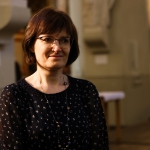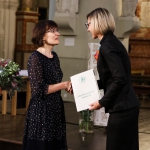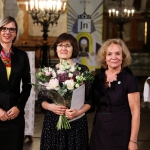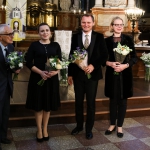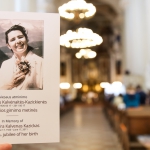News
June 17th, 2020 marked the 100th jubilee of Alexandra Kalvenas-Kazickas’s (1920 – 2011) birth. She was a loyal patron of Lithuanian culture and education. To honor this remarkable and noble person, Holy Mass was offered at the church of St. Johns’ in Vilnius, followed by a special event to award the recipient of a Literacy Award in memory of Alexandra Kazickas and her teacher Petras Butenas.
One of the most prominent Panevezys residents, Petras Butenas (1898-1980) was a linguist, anthropologist, interpreter, and teacher. Honorary teacher managed to balance his teaching and research work, while actively participating in the city’s social and cultural life. In 2002 Alexandra Kazickas established the award in the honor of her Panevezys Girls School Lithuanian language teacher, Petras Butenas.
In 2018 the Award was reintroduced under a little different name by the Kazickas Family Foundation and Lithuanian Language Association. This award is presented for distinguished research and teaching, while also promoting the language, areas that were important to Petras Butenas.
In 2019 first recipient of a newly reestablished award was an educator, linguist, and Lithuanian language textbook author, Dr. Bronius Dobrovolskis.
The recipient of 2020 award is Lithuanian Language Institute member dr. Rita Miliunaite. The areas of her expertise cover normative linguistics, sociolinguistics, and internet linguistics. Rita Miliunaite is an author of 5 scientific theses, more than 45 published papers and more than 85 essays, co-author of many various published practical pieces (the most important one – a set of small books “Language Advise”). Rita Miliunaite also oversees the most changing area of the linguistics, terminology, and manages constantly expanding Lithuanian internet word data base. She is also a co-author of online games teaching Lithuanian language.
Dr. Rita Miliunaite was presented with a Literacy Award in Memory of Petras Butenas and his student Alexandra Kazickas at the church of St. Johns’ in Vilnius. Representatives from the Kazickas Family Foundation, Lithuanian Language Association, Lithuanian Language Institute, National Lithuanian Language Committee gathered on this occasion to congratulate Dr. R. Miliunaite. Music was provided by organ players prof. Leopoldas Digrys and prof. Renata Marcinkute Lesieur, solioists Milda Baronaite and Liudas Mikalauskas.
Dr. Rita Miliunaite shared her thoughts and gratitude with the guests during the evening:
The message announcing that I was a recipient of the Literacy Award in memory of Petras Butenas and his student Alexandra Kazickas was as unexpected as a warm summer rain out of a blue sky at the end of a sunny Spring day. Nobody warned me about nominating me for such an award. Caught by surprise by that warm summer rain, I tried to get used to this message, connect to the feelings it brought out in me and I’d like to share those feelings with you.
Gratitude
First comes the feeling of gratitude – to those who noticed and acknowledged my work. However, to this day it is still a big secret who nominated me. So I thank that secret group that initiated it. I also thank the Literacy Award in memory of Petras Butenas and Alexandra Kazickas committee. Thank you, Petras Butenas family, for continuing his legacy. Thank you, the Kazickas Family Foundation and Lithuanian Language Association for establishing the award and hosting such a beautiful event. I can’t not mention my colleagues, my allies, especially the ones from the Lithuanian Language Institute and the State Commission of the Lithuanian Language, as well as my family – my work wouldn’t be the same without your support and it would really be uncomfortable, because today Lithuanian linguists have to breathe quite a dusty politicized air caused by discord on language ideologies sometimes. But forget the dust, warm summer rain washes it away. It is my pleasure to mention last year’s recipient of this award, dr. Bronius Dobrovolskis. He was director at my very first place of work, right after my studies, Institute of Pedagogical Research. It is a great honor to stand next to him.
Respect for the Teachers
Another vivid feeling that came over me– fondness of Alexandra Kazickas’ idea to honor her teacher Petras Butenas each year, and today we honor her memory as well. According to Jurate Kazickas, president of the Kazickas Family Foundation, her mother Alexandra was a true patron of Lithuanian language and culture, supporter of Lithuanian Heritage schools in the United States, did everything quietly, without any advertisement. I prefer to work quietly as well, without any advertisement, and feel the happiest when my work is needed, when I can help someone or give any language advice. This occasion brought back some memories from 2018. While celebrating the centennial of the Restoration State of Lithuania, three ideas were suggested for Lithuania's future, one of them – “Teacher – prestigious career before 2025”. Today teachers just smirk sadly talking about it: where is that prestige that is supposed to show up? Even though it wasn’t my destiny to become a teacher, there were and still are many teachers in my family – from the generation of my grandparents and parents, my brother’s family to my son who is taking his first firm steps in the field of science and education – teachers with different area of focus: from languages and arts to mathematics and biophysics. So I know quite well what the word teacher meant to the generation of my grandparents, and I see teachers being treated as free market service providers, while their prestige is being measured by the size of a paycheck only. However, the best way to show appreciation to the teacher's profession, as we see today, is an honest respect, when the need to achieve the purpose of an idea is more important than an idea itself.
Pre-War Lithuanian Intellectuals
Honoring the memory of Petras Butenas and his student Alexandra Kazickas encouraged me to transfer my thoughts to Lithuania in the time period of my grandparents’ generation. Why do I think Pre-War Lithuanian Academia was so beautiful? Because of its cultural morals based on main principles developed by mankind living together throughout the year: integrity, decency, honor, and dignity. Their thoughts, way of life and work were in unison because the goal was clear: to dedicate themselves to the prosperity of Lithuania. Even later on, when many were forced to leave or were deported, it was their mission to work for its Homeland and its people.
Why are today’s ideas fruitless?
Why do people wander so much today? Why don't ideas mature and quite often bear no fruit? Let’s think, do such ideas have enough power to lift off, worn out by the constant encouragement just to use and enjoy, do they have enough space to grow, soar, when they are tangled in the webs of globalization, locked up in the buildings made out of concrete and glass, get tossed around in the internet dead-ends, while computer mouse keeps clicking: return, return…? After hitting the walls and screens, thoughts never manage to take off and come back with the only option left to think about yourself. That’s how we become a society of individuals focused on our personal consumer needs only.
The feeling of land, nation and language
Where is that space our thoughts need? Thankfully, there is plenty of it in Lithuania, however we might not know how to connect to it anymore, because first of all we lose the feeling of the land. Do we often say to ourselves: this is the land of my ancestors, I can stand firmly here and feel the strength from within its depth, I can breathe in fresh air and follow the bird gliding above in the sky? The distant horizons of the Suvalkija plains, Aukstaitija peaks, dunes by the sea make you longer for something, impossible to describe, and cause your heart to tremble picturing future discoveries. Here, in such spaces, a thought is born, a dream wakes up, an aspiration surfaces. That’s how the feeling of land turns into the feeling of Homeland, when allies need to come together for the mutual purpose. The feeling of Homeland cultivates the feeling of language. And that repeats itself from one generation to the next one, until our days.
What does Lithuania need?
What are the goals of our intellectuals? We are free, but how often do we find time in our daily routines to unfold a path for our thoughts, to nurture them not because of us, but because of Lithuania? It‘s been time-tested: if we want Lithuania to thrive, our most important goals must be clean air and water, green rich land, hard working and honorable, free and open to the world people, pure and viable language. Why the language? Petras Butenas answers that question in his 1925 paper „Language and Nation“: language is a part of a nation's culture, it makes up the soul of the nation, it is a driving force of the nation“. That is why I see a great purpose to dedicate my work, starting with the language standardization, new word research all the way to the educational Lithuanian language computer games, to the Lithuanian language as well. The ability to express our ideas in our native language helps us to feel free, vital, unique and makes us interesting to the world.
Jurate, the daughter of Joseph and Alexandra Kazickas, mentioned quite a few times: I am truly grateful that Tevelis and Mamyte were always saying “never forget your homeland”. Today’s beautiful celebration is the best proof of this noble family’s love for their Homeland and its people. Once again I sincerely thank everyone for coming to honor Petras Butenas and Alexandra Kazickas, as well as Joseph Kazickas’ memory. While finding the strength in our past, cherish the fire of the soul of our ancestors, ignite the feeling of the land, Homeland and language in the hearts of the young generation. Let this fire kindle our loved ones and allies, let it highlight the paths of our thoughts.
Recording of the event can be found here starting at 1:09
Photos: Gabija Kavaliauskaite

